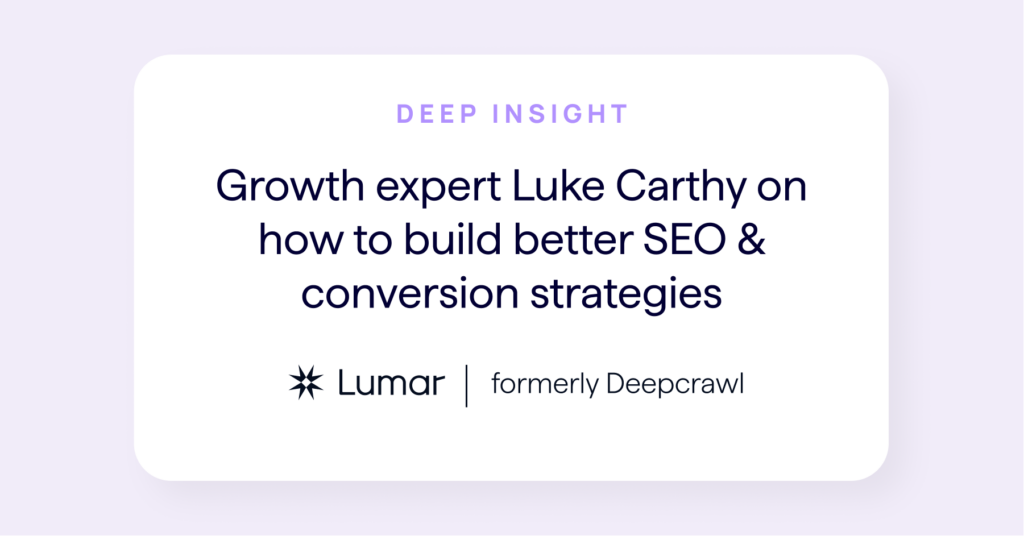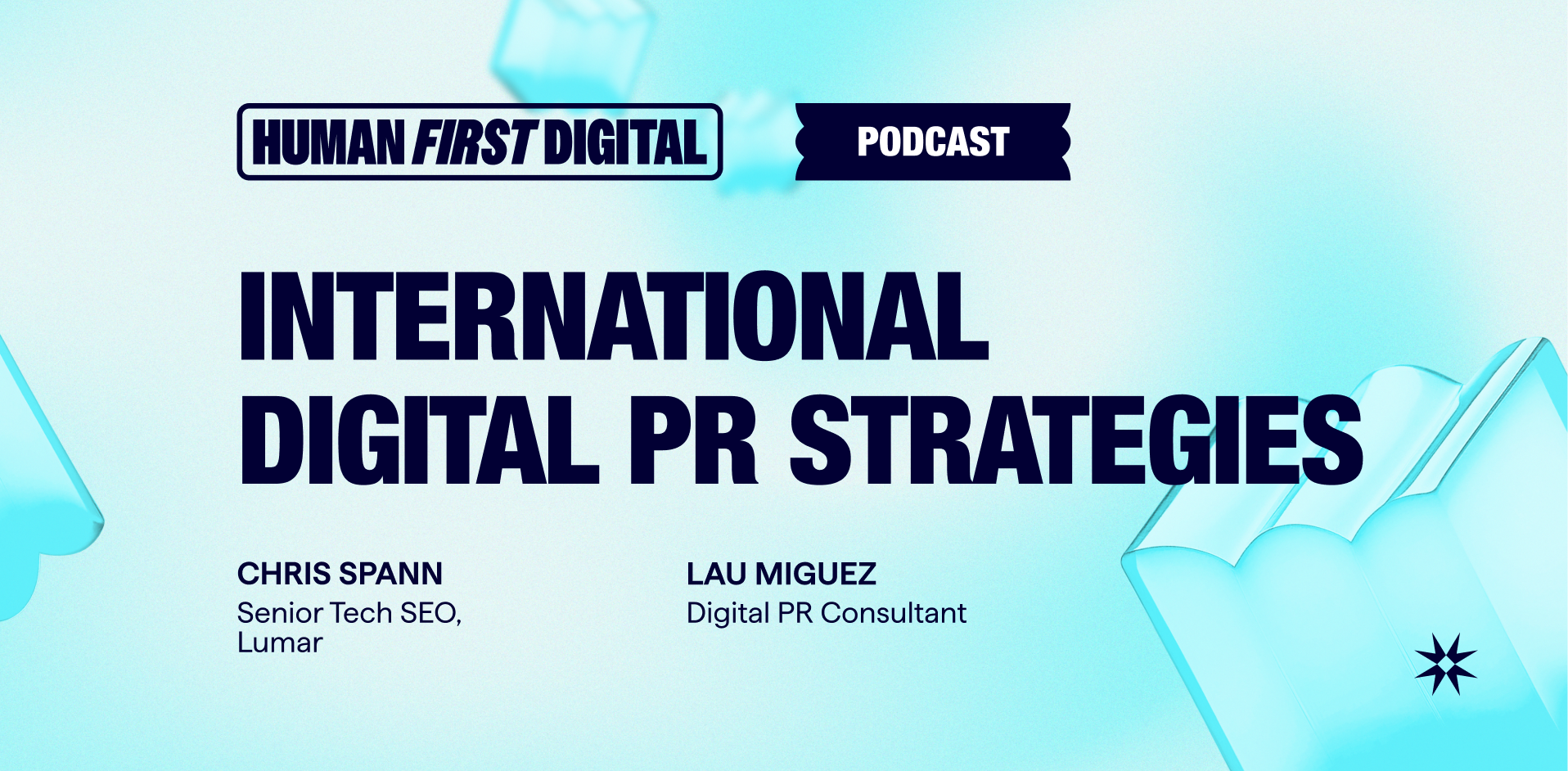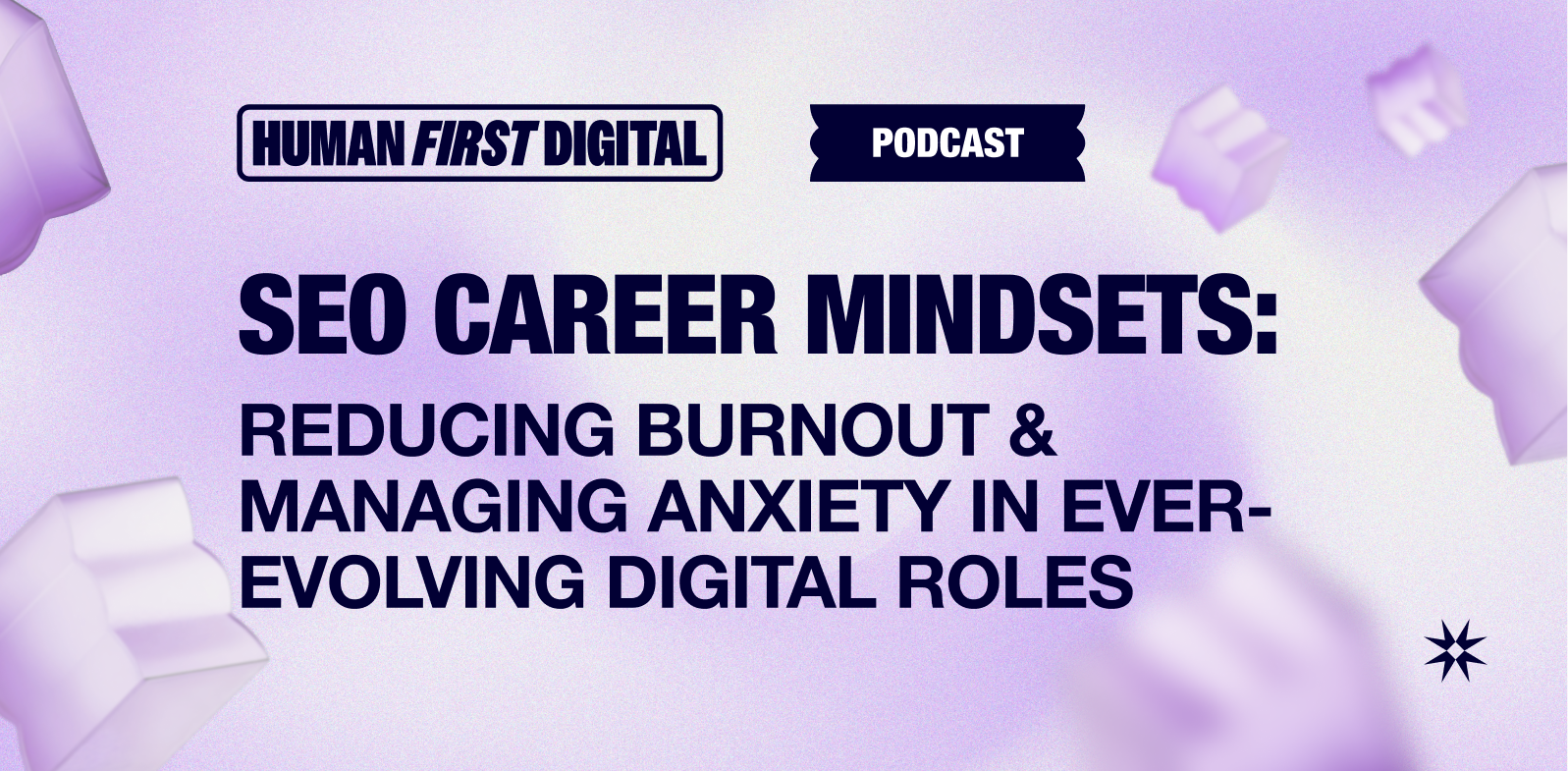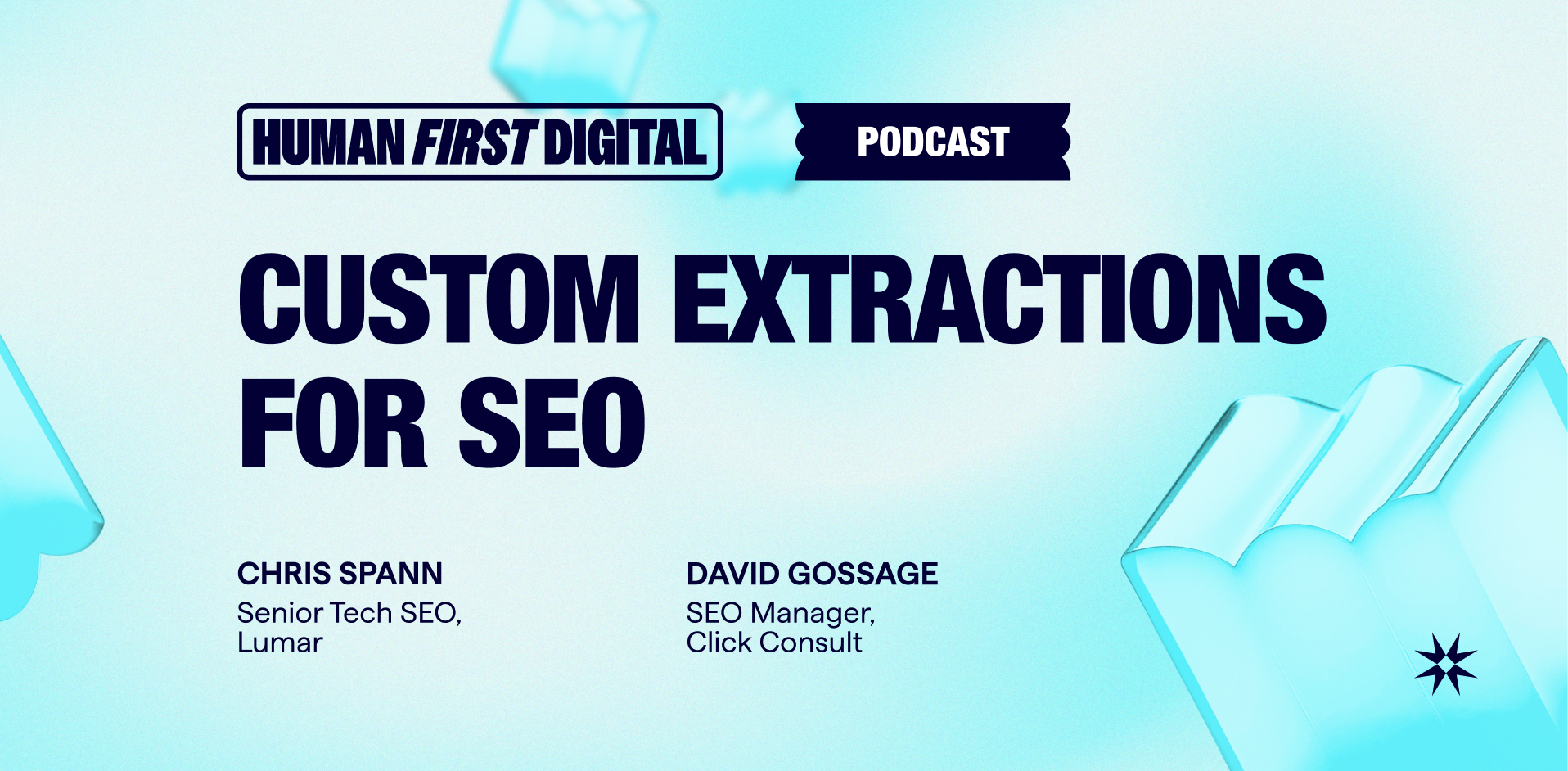We work with a lot of eCommerce companies here at Deepcrawl (now Lumar) and we’ve seen firsthand that SEO can have a real impact on conversions and revenue, particularly for online retailers. This interview is the latest in our Deep Insight Q&A series, an ongoing interview series that provides in-depth conversations with today’s leading SEO and digital marketing professionals.
Today, Arron Westbrook speaks with Luke Carthy, an eCommerce growth expert, international speaker, and founder of the recently launched eCom brand Afrodrops. In this conversation, they discuss the relationship between SEO and conversion rate optimization (CRO) — and how both efforts can work together to drive online revenue. Read on to learn how eCommerce businesses can better prioritize and structure their organic search strategies and boost conversions.
AW: We’ve been talking a lot lately about the concept of a search-first CMO at Deepcrawl — that is, marketers who truly embrace search engine optimization as part of their marketing strategies.
When you’ve worked with marketers who have an appreciation for SEO, do they tend to be more successful in terms of driving revenue and conversions? And how often do you come across senior marketers that have a search-first mindset?
LC: It’s rare. I think CMOs have an appreciation for search and an appetite for it, but it’s quite rare for them to put search before everything else.
At a CMO level, you might not have very granular knowledge of SEO — maybe they’ve had some experience in a previous role, but they might be a couple of years behind. But for a CMO to get that search is really important and make the time and the space for it — that is critical to success.
Every board member cares about how much money they’re making, or how much they are saving—and search has to be a part of that conversation. Otherwise, you’re just going to be chasing your tail, or spending a load of money on paid [channels] to try and close that gap. So I think it’s either down to the CMO to identify that search is important, or it’s down to a really good person on that team to be like, “this is why search is important,” and get the CMO to understand that.
From experience, I had an ex-boss some years back when I was in-house—she was brilliant. She was really empowering in the sense that she understood the importance of SEO from a commercial perspective. She had very little involvement herself in terms of the content and how SEO works, but she just gave me the remit and the autonomy to go away and crack the whip on it, knowing that she should feel confident that the gains in organic traffic would ultimately get in the wallet.
I’m a little biased, of course, but I’m also more than happy to tell a client when SEO is not their problem and to focus on something else. To give you an example, there could be a client where their SEO game isn’t great, but even if we increased their traffic by 50%, the sales aren’t going to come through because there are huge gaps somewhere else, like in product range or usability. So I’m more than happy to be in a situation where I can openly say to clients, “I know you brought me in for search, but that’s not your biggest problem.”
AW: One thing we find is that even when we speak to marketers who are acting well from an SEO perspective, they still are hesitant to invest in it—a tiny chunk of their budget might go toward SEO, but their focus is on things like paid channels. Why do you think that some CMOs and senior marketers are holding back from investing more in SEO? Could it be budget constraints or issues around successful execution?
LC: The analogy I like to use is that you can go and have a beautiful lunch at a nice restaurant that’s gonna take you a few hours, or you can just go and smash that Pot Noodle that’s around the corner in 10 minutes. Sometimes it’s just that everyone wants immediate gains, everybody wants to be in a situation where, in the next month they can start to show that “this investment of X thousands of pounds has yielded this movement”— ideally commercial, but it could just be some vanity metrics, but at least they feel they’ve got something to show.
I think with SEO, there is always the risk that you can invest—whether that’s in a new hire, whether that’s in taking the focus off of other activities—and three months could pass and nothing’s changed. To combat that, I won’t really touch SEO until I’ve met the development team. Otherwise, it’s not worth it because I can go away and do an incredible audit for you, but if you then come and tell me, “Oh, yeah, we’ve got this really bad relationship with our development agency and we haven’t got that many hours for updates, or we can’t afford them, or they’re not competent.” …then it’s kind of like, what was the point of the audit?
The worst case is that SEO doesn’t yield results because nothing is being done to fix the issues you find. But if you’ve got the dev team on your side and you understand what their pain points are, then you can see what success means to them and how to work together. Success to them could be something quite granular like page speed. The dev team issue could just be, “you know what, I’m in a situation where I’ve got tickets and I know what they are and I can get them done. And I have valid specs, and I don’t want to have to ask a bunch of questions.” But I can help with that. And all of a sudden SEO becomes attractive because you’re also speaking to the developers’ pain points and making it easier for them.
I think, long story short, if you’ve got a development team on board with SEO, things can happen really, really quickly.
In eCommerce, a lot of things happen on a template level. When you have an eCommerce store that sells 40,000 products, you can make 40,000 changes with just a relatively simple template change. You know, if canonical tags are off and you make one change at a product template level, there’s a pretty good chance you’re going to see something happening in the SERPs within, hopefully, a month or so.
SEO is sometimes seen as this big, huge investment where SEO is this big mountain to climb and it’s going to take years and years to get there. And the reality is, you’re probably right, to get to the peak of the mountain it’s going to take a heck of a long time. And this is a sweeping statement—I know there’s lots of caveats and edge cases to this—but paid search is very much seen as a lot of work for maybe a couple of weeks to build things up and switch them on, and all of a sudden it starts working. But SEO doesn’t have to be this huge behemoth of a project. You can absolutely slice it down into tackling a little bit of technical debt here in this sprint, getting rid of bloat URLs in the next one, rather than just seeing it as a behemoth of a project that doesn’t really have any tangible money attached.
AW: Yeah, I think that’s part of the reason why SEOs struggle. They can get too much in the weeds and don’t focus on the revenue and pipeline—the things CMOs and CEOs care about.
You work at the intersection of SEO, CRO, and eCommerce with some amazing brands. What would you tell senior marketers about how SEO and conversion rates relate to one another?
LC: So, conversion rates and SEO is something I don’t like to put a sweeping statement out for, because sometimes you can turn the tap up on organic and find that your conversion rate is still steady. I think when it comes to improving conversion, the first thing you have to do is take a look at what’s good, what’s bad in conversion terms, and improve those things first. But if you start fixing some of the conversion concerns — you might actually get an organic search improvement anyway, depending on what the CRO issues are.
To give an example, if you have a category page for say, greeting cards, that’s a big old category, isn’t it? So there’s a challenge there because ‘cards’ is so ambiguous as a query. What is the card for? How much does the consumer want to spend? If you forget SEO for a minute and you just want a really powerful merchandise experience that allows people to segment for what type of card they are looking for and what price range or season rather than just any card product… there’s a very good chance that that new page is going to rank better than the larger category page with thousands of results on it. So sometimes just addressing conversion and UX issues is enough to inherently also improve organic search.
AW: How important do you think technical SEO is to success in eCommerce?
LC: I would say tech SEO is huge in eCommerce particularly. It really depends on the size of the site, but when you think about faceted navigation in eCommerce, and filters, and site search, and all of these areas where there’s huge potential for a lot of dynamically generated URLs (into the millions, if not billions)—I’ve seen it before where, figuratively speaking, Google just gets exhausted crawling so much crap.
The best place to take a look is, when you go into Google Search Console, look at coverage and look at excluded URLs. And you see you get only a thousand of them. So it’s not hugely comprehensive. But you might have a situation where you have threefold more excluded URLs than Google’s decided to include there, and then you have a problem. So technical SEO for eCommerce is imperative— it’s foundational for SEO performance, regardless of how well that site converts.
So yeah, it’s hugely important. I’ve seen so many sites where you can rank for things that you have absolutely no interest in as a result of just allowing your site search to go crazy. As an example, I’ve got a client in the world of finance and international money transfer for businesses and they are ranking for random queries like Viagra and some completely unrelated terms, right? The usual kind of sex, gambling, and drugs that gets entered into search engines, right? And it’s all because their site search is open to search engines. So I imagine somewhere there’s a bot or scraping tool or something that’s injecting these queries into the site search index. And they might not run very well, but the potential for them to rank for these unrelated terms is potentially quite great. And that’s because they’ve neglected technical SEO. That’s not even eCommerce, just a really basic static site for the search engine. Multiply that by 10,000 when you think about all the products, categories, subcategories, pagination, et cetera in eCommerce. So technical SEO is massive—so, so important.
AW: You’ve spoken a lot about brands that could up their SEO game to really build growth. Which brands at the moment do you think could skyrocket their revenue if they invested more time in SEO and CRO?
LC: Yes, good question. Caterpillar is one — they’re almost too big in the sense that they rest so heavily on their brand integrity in that space that they neglect a lot of detail with their website. The reason I say that is that they have a division where recently, in the past 5 years, they’ve launched a website where you can go and order your Caterpillar parts online. The website is so poorly optimized and kind of a mess. And it’s gonna take some investment to fix it, but when you think about Caterpillar, that business investment is relatively small compared to the risk of not doing it. Of course, in the UK, their biggest immediate threat is JCB. I get that, in the US, they’re kind of the market leader, but they have to think outside of that.
That one’s a bit specific, but Primark is also a go-to example of mine because they just don’t have any kind of web retail presence. But let’s forget about the ability to buy online. Let’s not talk about that, because that’s a commercial decision that I feel quite strongly about but they have their reasons for it. But there’s nothing wrong with a website that allows you to just browse products, even just the catalog, even if it’s only their new items in there or seasonal highlights. You’ve got to think about people with disabilities or people who don’t want to have to go into a store in person to see what’s about, I think that could be really powerful for them.
But what’s really interesting is, if we think about COVID, some of the brands I was looking at that I thought were trash in their online presence have really stepped up their game in the last 12 months because it was “do or die” digital. I think what COVID has certainly taught us is that when people are pressed to a point where it’s like, it’s digital or it’s nothing, people have really started to improve.
But I do still think that there’s going to be a load of brands out there, especially with faceted navigation, that will really need to step up and make things better. One brand that springs to mind is Clintons cards. Again, they always seem to be struggling, you know, you’ve got Moonpig and all these really kind of disruptive brands that are coming up. Clintons has been there since I was a kid, and probably even longer than that. And it just seems to be this kind of shriveled up traditionalist eCommerce store for greeting cards and stuff. And I think SEO is one thing they can focus on, but they almost need to just reinvent themselves, in a way. I can see in the next couple of years, if they don’t implement some big changes in their approach, it could be that Clintons shuts up shop.
AW: The next question is: why? Why do you think CMOs and other senior marketers should invest in SEO? What advice would you give them if they’re not yet convinced by SEO as a performance marketing channel? I know you mentioned that it takes time to see results from SEO, which can be a challenge for CMOs, but what advice would you give them?
LC: Investing in SEO earlier is just easier. Assuming you’re going through a redesign or migration with your site, or if it’s a brand new business that’s launching, even if it’s being bootstrapped… It’s just so much easier to spend, as a ballpark number, 15 hours at the beginning to set yourself up for success with SEO. The time depends on the size of the site, but let’s say 15 hours at the beginning, vs. 1,500 hours in 18 months.
Trying to remedy all the stuff that hasn’t received attention at the start, later on, is harder. It’s a difficult thing to sell sometimes because the immediate pushback is “how much money is this going to make?” It should be more about the question: “how much money are we going to lose as a result of not investing in search?”
With search, if you don’t do it, you’re going to be in a situation where someone else will invest in it and then you’re going to be penalized as a result of not doing it. It’s not a kind of fear-mongering, “you must do or die” thing, but at the same time, for every month, every quarter, and every year that you aren’t taking search seriously, somebody else out there is.
It’s broader than just technical SEO as well because it’s so easy for people to just throw out a number, ring-fence a budget, hire an agency, and just let them take care of it and feel that “yeah, SEO has been taken care of” because an agency has an incredible deck and has promised the world and promised to take care of it. But if you don’t have the in-house people who can drive and enforce structures and logic around how things should be done, then it’s not really going to work.
I’ve seen so many businesses who have siloed teams—and I’m sure lots of people will relate to this—where you’ve got merchandising in one corner, graphic designers in another, and then you have sales teams and people responsible for product photography and descriptions in other corners. And none of these teams will have any kind of real understanding, or even baseline understanding, of what SEO principles you need to stick to throughout the process.
Let’s use the example of greeting cards again. Father’s Day is a good example. Lots of merchandisers I’ve worked with have a really bad habit of creating a gorgeous banner and then rather than linking to the category page, they just site search for the query “Father’s Day” and link to the search page. Obviously, any SEO is going to be like, “Why? Just link to the category page. Or build a category page for it if you don’t have one.”
It’s those kinds of principles, nothing super sciencey. It’s just having a baseline rulebook of SEO practices and things to stick to.
To answer the question, it’s more that if you’ve don’t invest in SEO, then that’s the risk. People invest in technology, and stock, and infrastructure or warehouse systems and people, but SEO is sometimes seen as this weird thing where businesses too often feel like it’s a “we only need this when the fire starts” situation—at which point, the fire’s already started. It’s never too late, but then you’re in a situation where, if you haven’t taken any proper steps at the start, the site will never be as good as it could have been and you’ve already missed out on traffic.
AW: Yeah, exactly, and you’re kind of chasing shadows at that point, essentially.
LC: It’s really refreshing when clients get in touch, and they say, “Hey, we’re planning a migration, we’d love to have a chat with you.” I’m like, “yes!” I almost want to give them a discount for being proactive, rather than having people coming in saying, “Oh, we migrated three months ago, why have we lost all our traffic?” Then, you know, I can help fix it. But they’re in a situation where a lot of traffic is already lost. And it could have been avoided if the migration was done successfully in the first place.
AW: Do you think we’ll get to the stage where SEO is widely seen as a performance marketing channel, where the CEO is interested in it?
LC: It’s getting there, but I think it can only ever be seen as a performance channel if you have people who can communicate the way they need to with senior management. The perception of SEO has gone from, years ago, just throwing in keywords, to including technical SEO and everything else that informs it today.
I’ve worked with brands where the value of SEO was fully understood. When I was in-house, before becoming a consultant, I was in a very fortunate position where I reported into the MD and I managed the dev team—and I was the Head of SEO. It was the perfect storm where I had autonomy from the MD, I could do what I needed, and the dev team was managed by myself so I could talk to them on a daily basis. And the roadmap was set by me and I could work out where the SEO gaps were and how to help with that. It was brilliant. And the business understood the value of it. The MD and I never spoke about technical stuff unless he asked out of curiosity because it’s not really his remit. As part of senior leadership, he’s got a million other things to look at. And boring him with detailed SEO metrics is not one of them. I think it’s down to us as SEOs, as consultants, as product owners, to tell senior leadership about the benefits of SEO, but they aren’t necessarily going to be interested in the mechanics of it.
So it can work really well to have search as a priority in a business, you just need the right set-up. But when you don’t have the right set-up to manage and prioritize SEO, it can be seen as a hindrance to siloed teams rather than as a channel that we should be celebrating.
AW: It’s interesting that you were managing the developers, I don’t think I’ve ever heard of that. Do you ever find that in other companies?
LC: I’ve been lucky enough to do it twice. But it’s because of the structures that were in place. I was brought into the first business, weirdly enough, as a merchandiser. Within two weeks, I said, “You know what, I found all these SEO problems. There’s no one currently in the business who can fix this, but I can. If you want me to do it, I need exposure to the devs and I need exposure to the agency to get them on board.”
Within two months of my starting, my role changed from merchandiser to product owner because I was the person to speak up, identify the problem, and talk about the problem in a way that was commercially savvy rather than talking about canonicals and 404s and that sort of thing. But you have to ruffle some feathers and you have to have candid conversations with people and speak up.
There’s a mindset shift that is needed. Dev teams are often concentrated on the technical elements and doing everything in a technically correct way, but there’s no point in having all of that if, two years from now, you have no business. So I came into managing the dev team to maintain a focus on the customer side of things. I felt they were happier because I could show them the results their dev ticket work was having on the larger business. I think it’s a great set-up to have someone who isn’t necessarily a developer at the head of a dev team; someone who is focused on the output and results—who understands SEO. If you have someone who can speak the commercial lingo about it to the board, then it’s a perfect way to get SEO molded into a high-performing channel.
AW: Do you think that sort of structure can work in larger businesses?
LC: I think it can, but it can’t be one person. You can have a champion for it, but everyone needs to speak the same language. It’s difficult, I would find it a challenge because you’ve got internal politics, you’ve got people who’ve worked there for 25 years, an attitude of “this is how we’ve always done it”, and behaviors that need to be changed. It’s not going to be easy.
AW: Yeah, you really need a champion, essentially. Someone who believes in search and is willing to make those tough calls.
Okay, so the final question: I know you already use Deepcrawl, but what do you like about using SEO platforms — whether Deepcrawl or others — and why do you think people should consider using these sorts of cloud-based platforms to support their search optimization?
I think the thing I love personally about cloud-based crawlers, specifically Deepcrawl, is that I don’t have to wait around — I have to wait for the crawls to be completed, but the crawls are on a separate instance from my own machine. Without cloud-based crawlers, the worst thing is when you’ve set a crawl off in the morning, you forget about it, then you have that sobering feeling where the crawl is at like 13% after 60,000 URLS and then your machine runs out of charge or loses internet access or something and you start to get “connection refused”. So when I’m crawling large sites, anything over 100,000 URLs, this is where Deepcrawl really makes sense. You can set it, leave it, and know that you don’t have to worry about it completing.
When you think about all the tools available in the crawler market, there are lots of different ways to slice and dice and view metrics. But the clearest draw for a platform like this is that it’s in the cloud, it’s a separate instance and you don’t have to worry about it. It’s peace of mind.
I don’t want to spend time looking into where to make space on hard drives or personal cloud storage. Crawling anything over 100,000 URLs is going to bring my machine to a halt. I don’t want to have to worry about crawls failing or spending unnecessary time. Cloud-based platforms like Deepcrawl are great for scalability and automation.





